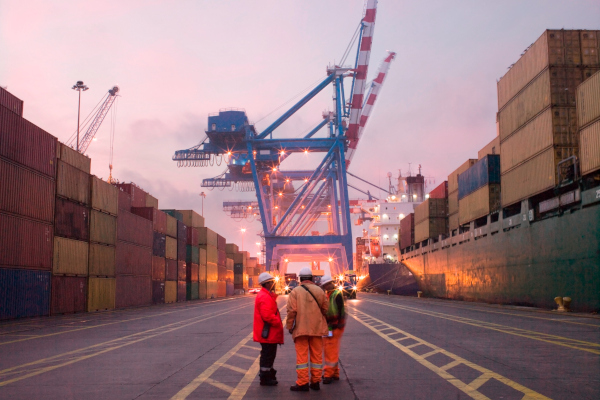The COVID-19 pandemic has disrupted the global supply chain and exposed its vulnerabilities. The widespread lockdowns, travel restrictions, and border closures have created massive disruptions, leading to shortages of critical medical supplies, raw materials, and consumer goods. The pandemic has highlighted the importance of supply chain resiliency and the need for businesses to rethink their strategies in a post-pandemic world.
Supply chain resiliency refers to the ability of businesses to withstand and recover from unexpected disruptions to their supply chain. Resilient supply chains are characterized by flexibility, redundancy, visibility, and collaboration. Businesses with resilient supply chains can quickly adapt to changes in demand, supply, and logistics, maintain continuity of operations, and mitigate risks.
The pandemic has shown that businesses which were better prepared for disruptions fared better than those that were not. For example, businesses that had diversified their supply chains, had multiple suppliers, and had invested in digital technologies were able to mitigate the impact of the pandemic. They were able to quickly shift to alternative suppliers and adapt their operations to meet changing demand. On the other hand, businesses which were heavily dependent on a single supplier or a single country for their supplies were severely impacted by the pandemic. They experienced shortages, delays, and price increases, which affected their ability to meet customer demand and maintain profitability.
The pandemic has also highlighted the need for businesses to collaborate and share information with their suppliers, customers, and logistics partners. Collaboration and transparency can help identify potential risks and disruptions in the supply chain, and enable businesses to take proactive measures to mitigate them. For example, businesses can share real-time data on inventory levels, demand forecasts, and logistics capacity, which can help optimize the supply chain and reduce waste.
In a post-pandemic world, supply chain resiliency will be more important than ever. Businesses need to invest in building resilient supply chains that can withstand future disruptions. Here are some strategies that businesses can adopt to enhance their supply chain resiliency:
1. Diversify the supply chain: Businesses should avoid relying on a single supplier or a single country for their supplies. Instead, they should diversify their supply chain by sourcing from multiple suppliers and countries. This can help reduce the risk of disruptions due to geopolitical or natural disasters.
2. Invest in digital technologies: Digital technologies such as IoT, blockchain, and AI can help businesses gain real-time visibility into their supply chain and optimize their operations. For example, IoT sensors can track the location and condition of goods, while AI can analyze data to identify potential risks and predict demand.
3. Collaborate and share information: Businesses should collaborate with their suppliers, customers, and logistics partners to share information and identify potential risks in the supply chain. This can help mitigate risks and enable businesses to respond quickly to disruptions.
4. Build redundancy: Businesses should build redundancy into their supply chains by having alternative suppliers, backup inventory, and redundant logistics capacity. This can help ensure continuity of operations in the event of disruptions.
5. Continuously monitor and evaluate: Businesses should continuously monitor and evaluate their supply chain performance to identify areas for improvement. This can help them stay ahead of potential risks and improve their resiliency over time.
The COVID-19 pandemic has highlighted the importance of supply chain resiliency. Businesses that invest in building resilient supply chains can withstand future disruptions and gain a competitive advantage in a post-pandemic world. By adopting strategies such as diversifying the supply chain, investing in digital technologies, collaborating and sharing information, building redundancy, and continuously monitoring and evaluating, businesses can enhance their supply chain resiliency and ensure continuity of operations.
About the author:
Bob Brennan is senior managing director, head of integrated solutions at SGS Maine Pointe. He has more than 35 years of experience in paper packaging manufacturing operations leadership, private equity advisory and general management, and has played a pivotal role in turning around troubled operations and succeeded in generating lasting cultural change. Bob can be reached at [email protected].
SC
MR


Latest Supply Chain News
- How S&OP provides the answer to in-demand products
- AI, virtual reality is bringing experiential learning into the modern age
- Humanoid robots’ place in an intralogistics smart robot strategy
- Tips for CIOs to overcome technology talent acquisition troubles
- There is still work to do to achieve supply chain stability
- More News
Latest Podcast

 Explore
Explore
Topics
Procurement & Sourcing News
- How S&OP provides the answer to in-demand products
- There is still work to do to achieve supply chain stability
- Blooming success: The vital role of S&OE in nurturing global supply chains
- How one small part held up shipments of thousands of autos
- Shining light on procurement’s dark purchases problem
- 40% of procurement leaders ignoring sustainability, study reveals
- More Procurement & Sourcing
Latest Procurement & Sourcing Resources

Subscribe

Supply Chain Management Review delivers the best industry content.

Editors’ Picks





